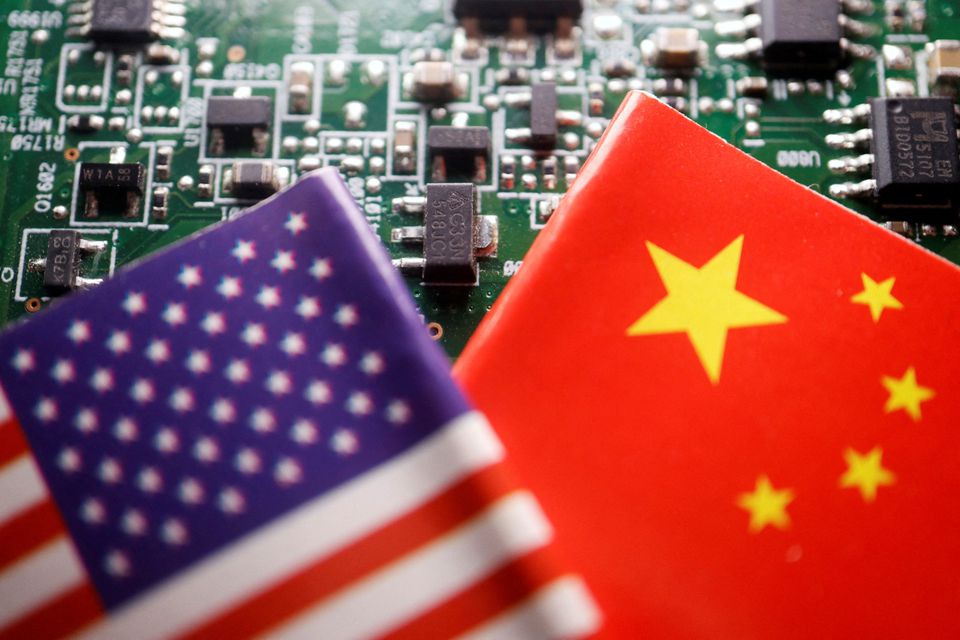
President Joe Biden on August 9 signed an executive order that will prohibit some new U.S. investment in China in sensitive technologies like computer chips and require government notification in other tech sectors.
The long-awaited order authorizes the U.S. Treasury secretary to prohibit or restrict U.S. investments in Chinese entities in three sectors: semiconductors and microelectronics, quantum information technologies and certain artificial intelligence systems.
The administration said the restrictions would apply to "narrow subsets" of the three areas but did not give specifics. The proposal is open for public input.
The order is aimed at preventing American capital and expertise from helping China develop technologies that could support its military modernization and undermine U.S. national security. The measure targets private equity, venture capital, joint ventures and greenfield investments.
Biden, a Democrat, said in a letter to Congress he was declaring a national emergency to deal with the threat of advancement by countries like China "in sensitive technologies and products critical to the military, intelligence, surveillance or cyber-enabled capabilities."
China said on August 10 it is "gravely concerned" about the order and that it reserves the right to take measures.
The order affects normal operation and decision-making of enterprises, and undermines the international economic and trade order, a statement from the Chinese Commerce Ministry read.
The ministry also said it hopes the U.S. will respect laws of the market economy and the principle of fair competition, and refrain from "artificially hindering global economic and trade exchanges and cooperation, or set up obstacles for the recovery of the world economy".
The Chinese foreign ministry said the country was "strongly dissatisfied" with and "resolutely opposes the U.S.'s insistence on introducing investment restrictions on China", having also lodged solemn representations with the U.S.
China urged the U.S. to fulfil Biden's promise of no intention to decouple from China or obstruct China's economic development, the ministry said in a statement.
SEMICONDUCTORS A PRIORITY
The proposal focuses on investments in Chinese companies developing software to design computer chips and tools to manufacture them. The U.S., Japan and the Netherlands dominate those fields, and the Chinese government has been working to build homegrown alternatives.
The White House said Biden consulted allies on the plan and incorporated feedback from Group of Seven nations.
"For too long, American money has helped fuel the Chinese military’s rise," said Senate Democratic Leader Chuck Schumer. "Today the United States is taking a strategic first step to ensure American investment does not go to fund Chinese military advancement."
The regulations will only affect future investments, not existing ones, Treasury said, but it may ask for disclosure of prior transactions.
The move could fuel tensions between the world's two largest economies. The Chinese embassy in Washington said it was "very disappointed" by the measure.
U.S. officials insisted the prohibitions were intended to address "the most acute" national security risks and not to separate the two countries' highly interdependent economies.
Republicans said the order was rife with loopholes, such as only applying to future investment, and was not aggressive enough.
SOME EXEMPTIONS EXPECTED
The order will prohibit some deals and require investors to notify the government of their plans on others.
The Treasury said it anticipates exempting "certain transactions, including potentially those in publicly traded instruments and intracompany transfers from U.S. parents to subsidiaries."
The Chinese tech industry, once a magnet for U.S. venture capital, has already seen a drastic decline in U.S. investment amid intensifying geopolitical tension.
Last year, total U.S.-based venture-capital investment in China plummeted to $9.7 billion from $32.9 billion in 2021, according to PitchBook data. This year so far, U.S. V.C. investors only put $1.2 billion into Chinese tech startups.
The measure is expected to be implemented next year, a person briefed on the order said, after multiple rounds of public comment, including an initial 45-day comment period.
REPUBLICAN SEES MANY LOOPHOLES
Republican Senator Marco Rubio said the Biden administration' plan was "almost laughable."
"It is riddled with loopholes, explicitly ignores the dual-use nature of important technologies, and fails to include industries China’s government deems critical," he said.
A spokesman for the Chinese embassy in Washington said the White House had not heeded "China’s repeated expression of deep concerns" about the plan.
The spokesman said more than 70,000 U.S. companies do business in China. The restrictions will hurt both Chinese and American businesses, interfere with normal cooperation and reduce investor confidence in the U.S., he said.
The Semiconductor Industry Association said it hopes the order will enable "U.S. chip firms to compete on a level-playing field and access key global markets, including China."
Emily Benson of the Center for Strategic and International Studies (CSIS), a bipartisan policy research organization, said key questions are how the plan affects U.S. allies and how China responds.


